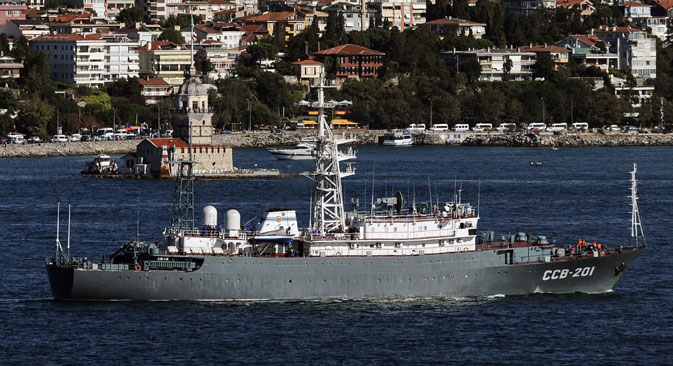
A Russian military intelligence ship, which leads a group of Russian warships, unseen, sails through the Bosporus in Istanbul, Turkey, September 5, 2013. Source: AP
Recently, several Russian navy ships sailed to the Eastern Mediterranean. Large landing ships of the Black Sea and Baltic fleets—“Novocherkassk” and “Minsk,” respectively—and the reconnaissance Black Sea Fleet ship “Priazovie” set out on a Mediterranean journey from the Novorossiysk naval base. In the navy’s main headquarters, it was reported that the “Novocherkassk” is carrying a sub-unit of the Black Sea Fleet’s marine brigade.
"Chevalier Paul"—one of the most modern frigates in the French navy—set off to the eastern part of the Mediterranean Sea. In addition, there are five American destroyers equipped with cruise missiles in the region: a group of ships in the aircraft carrier "Harry Truman," missile cruisers "Gettysburg" and "San Jacinto" and two destroyers. It is noteworthy that some of the planned vehicle duties have already ended, but they have remained in the region on the order of the U.S. navy’s command.
If the “Novocherkassk” and “Minsk” is going to the Mediterranean Sea as part of the ship's permanent, Russian naval task-force rotation (which, according to the command, is scheduled to run until mid-September), the “Priazovie” is being directed to the region to raise intelligence on the situation off the coast of Syria.
This is a normal practice of any fleet in the case of increasing tension in a particular area of the ocean or the sea. The situation around Syria will be tracked on a full scale, because, in addition to reconnaissance ships, the ships from the Russian navy in the Mediterranean Sea will also be carrying out the opening and tracking of the situation, it was stated by Russia’s General Staff.
Currently, the members of the Russian inter fleet group in the Mediterranean Sea are large amphibious ships—“Admiral Nevelsky,” “Peresvet” and “Alexander Shabalin”—the guard ship “Fearless,” and support vessels. In addition, the large, anti-submarine ship “Admiral Panteleev,” on board of which there is the operational headquarters of the navy command in the far field, has already arrived in the designated area as planned
In the coming days, large anti-submarine ships of the Northern Fleet will join the navy grouping and, later, it will be supported by the Black Sea Fleet missile cruiser “Moskva,” called by NATO as the “aircraft carrier killer.” It is assumed that, with the arrival of the cruiser in the middle of September, the operational command of the navy’s inter fleet group will be relocated there from the “Admiral Panteleev,” and “Moskva” will thus become the flagship of the Mediterranean group of navy ships.
In addition to this, in the near future, the Baltic Fleet destroyer “Pushy” and the Black Sea Fleet patrol ship “Nastoichiviy” will join the structure of the task force. At the navy’s headquarters, it was noted that the task of the crews patrol was delivered a few days ago, and the preparation for a long voyage is under way as a matter of urgency. The Pacific Fleet missile cruiser “Varyag” may join the group together with them.
As it was explained by the Russian navy, part of the Mediterranean grouping is adjusted “to match different versions of events” in the region.
"Today, we estimate the composition of our forces in the Eastern Mediterranean as sufficient for solving the above problems. For a comprehensive observation of the situation in the area, there are the navy’s task force reconnaissance and combat ships. If necessary, they, along with submarine forces, can have a serious impact on the current military situation, even now,” the navy stated.
However, the Russian Ministry of Defense stressed that the main task of a permanent Russian naval task force in the Mediterranean Sea is now a “comprehensive monitoring of air, underwater and above-water conditions in the area of location.” Russian warships have no plans to engage in combat in the Mediterranean.
All rights reserved by Rossiyskaya Gazeta.
Subscribe
to our newsletter!
Get the week's best stories straight to your inbox